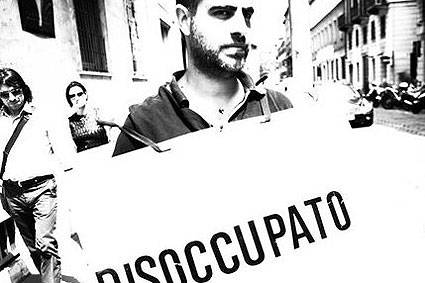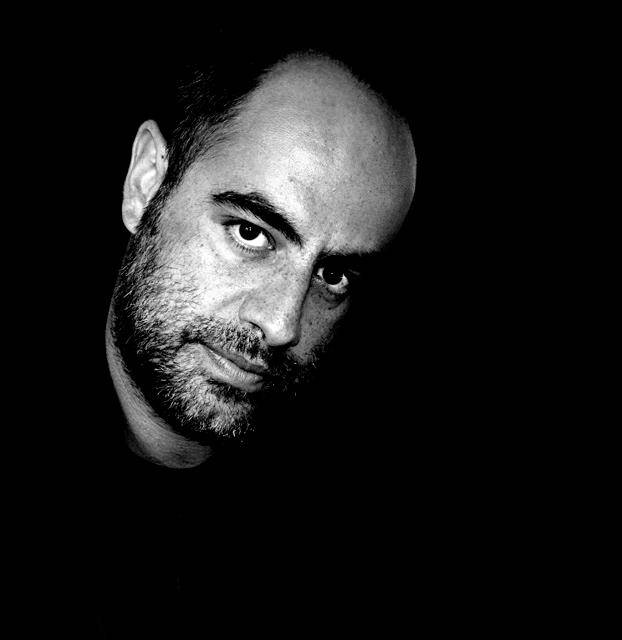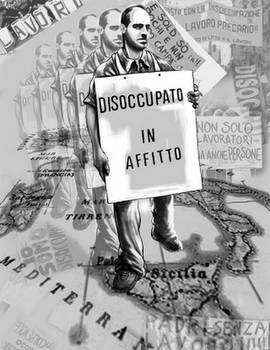Unemployed for Rent
He is from Sardinia and he is looking for a job. His way to find it is rather different than usual. People send resumes, he travels around Italy carrying a sign “Disoccupato in Affitto” (Unemployed for Rent).
His name is Pietro Mereu and the Italian news are talking about it incessantly. TG2, TG3, Sky News, Mediaset Tgcom 24, Vanity Fair, Libero, Il Fatto Quotidiano, the International Film Guide are just a few of the national and international outlets that have told his story.
The story of a guy, one of millions, who is suffering from the economic crisis that has struck Italy, and the rest of Europe, and who is fighting hard to find a job. As he travels to nine Italian cities, Rome, Florence, Lecce, Cagliari, Genoa, Bologna, Verona, Naples and Milan, he shoots a documentary, financed by his parents and his business partner Luca Merloni, (75 minutes running time) that is at the same time an investigation on the job situation in Italy, a sarcastic provocation and a challenge with himself.
As he carries his sign, people react with a smile but also with bitter considerations on the current dramatic situation Italians live in.
We got in touch by chance, through a mutual friend, and his story hit me hard as so much of what has happened to him has happened to me (just to mention an example, employers who don't pay) and so many I know.
What is your professional background?
I have worked in television for about 5 years. I worked in production and in the writing department. I also have experience in public relations and event organization. Right before becoming unemployed I collaborated with a film distribution company, but they never paid me.
Through the years I did various things though, I was a sales rep, a real estate agent, whatever I could find although my dream, obviously, is film making. I have shot a documentary before this one, a film on foreign opera singers in Italy, and I would like to shoot more personal documentaries and even comedies.
How did you get the idea to shoot this documentary and how did you select the cities you visited?
Before the documentary I had the idea to put myself up for sale in a home furnishing store. I lived there for a month. Then I discussed a further development of my story with my co-writer, and actual cameraman who shot the documentary and followed me all over Italy, Luca Merloni. The cities were selected because of actual needs, meaning those are cities where I have friends who could take me in. By coincidence they are spread all over the country, north, center and south, so that helps me give a more complete picture.
How did people react when they saw you? Any positive or negative memories?
People are really taken aback when they first see me. They think it's a joke, but when they realize that is not the case there is plenty of solidarity. A journalist in Milan tried to give me 20 euros. I refused. In Bologna a woman gave me 5 euros, but I gave them to a homeless around the corner who needed them more than I. In Genoa, a city know for being “cheap,” they bought me drinks. In Naples, a city where the economic/job crisis is felt even more, they were surprised to see someone who was not local living in such a desperate situation. All memories are positive, I can really say this trip was an amazing experience, one of the best of my life.
Did you get any job offers? If so, did you accept any?
In Lecce I worked as a bartender in a pretty fancy bar. It lasted one night only but I became friends with Anselmo, an Italian guy, who after having worked abroad for years, has returned home to train bartenders.
Was there ever anybody who did not realize you are looking for work and actually thought you were begging for money?
Yes, there were plenty of people who thought I was begging for money, but I never accepted any. A priest suggested I go to Caritas (a catholic charity), but I told him I am not at that stage yet.
Why, do you think this documentary should reach the US as well?
I think Americans should be aware of the current economic state in Italy. This will help them understand that we all are on the same boat. My work is not that different from the work of Michael Moore (whom I wish to meet one day) and Matt Spurlock, with nuances of the work of Nanny Loi, a Sardinian director who loved to provoke.
How's the situation in Italy now?
If you want a job in Italy you have to be extremely lucky or come from a family that has a good professional network and so that can help you. The situation is incredibly hard, especially for the young generations. They cannot find anything. There are some manual jobs available but Italians don't take them as the level of exploitation is high. The phenomenon that's on the rise right now is that of the esodato. The term was coined in 2011 after the social security reform to describe those workers without a job and without any government subsidy. Their age range goes from 50 to 65, and they basically have nothing until they turn 67, when they are eligible for social security.




































i-Italy
Facebook
Google+
This work may not be reproduced, in whole or in part, without prior written permission.
Questo lavoro non può essere riprodotto, in tutto o in parte, senza permesso scritto.